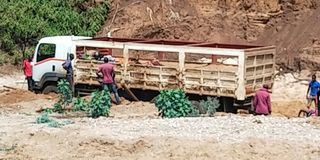Kajiado sandpits, where boys sell their future on the cheap

Sand harvesters load a truck at Maparasha River in Kajiado central sub county recently.
In the sandpits of Kajiado County, the aspirations of an entire generation are being dug up and sold off, one lorry load at a time, to feed the insatiable appetite of modern construction at the expense of formal education.
Every year, hundreds of boys drop out of school to join the trade in pursuit of overnight success, the allure of quick money proving too tempting to allow them to think about their future or take their education seriously.
For 17-year-old *Nkatu (not his real name) from Mashuru Sub-county, it means a better future. “All my older brothers are in the trade and are taking care of their families. I dropped out of school in Class Six two years ago and have so far managed to buy a motorcycle,” he told the Nation.
The sector employs 500,000 people, both directly and indirectly, with 22,000 lorries registered under 67 Saccos ferrying sand everyday, according to county government records.
Education standards have taken a big hit. Literacy levels in Kajiado stand at 41 per cent, with rural areas worse off. Many boys drop out of school to herd cattle and harvest sand while girls are circumcised and married off.
The county government, alarmed at the toll sand harvesting is taking on education, has launched an initiative to dissuade children from dropping out of school. It has also launched education programmes for drop-outs, said County Director of Adult Education and Continuation Mercy Njiriri.
“We urge those heading sand harvesting saccos to ensure their members are 18 and above,” Ms Njiriri said.
She cited lack of teachers, classrooms and means of transport to reach villages as major challenges facing the adult education programme.
“We are have classes under trees,” she said, adding that men shun sharing sessions with women, forcing some classes to be held in turns. But there is hope of a change in attitude. Some dropouts who spoke to the Nation said their parents were not keen on formal education.
They were also lured by the easy money. They now want the government to set up more adult education centres, especially in far-flung villages.
“Most of us are willing to continue with our studies. We have realised we erred by dropping out of school,” said Mr Robert Kaimer. Rombo Assistant Chief Patrick Kutata said lack of an education has come back to haunt young parents, more so in the wake of the Competency-Based Curriculum.
“Parents are unable to help their children with their homework, affecting the levels of education in the county,”he added.
County Kenya National Union of Teachers Secretary Elie Korinko said the transition rate from primary to secondary schools is low. He attributed the crisis to widespread poverty.





